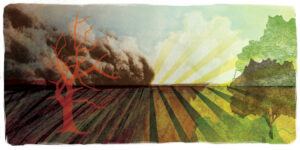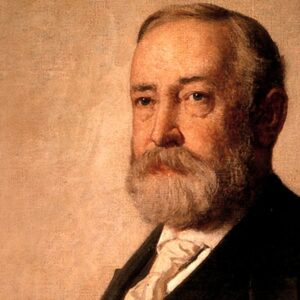Americanism Redux
February 9—Life and the American Founding—Today 250 Years Ago: 1773
The tiny seeds had gone in the ground a few weeks back, after Christmas. Planted in dirt finer than grains of sand, the seeds were now seedlings. Tender and green shoots of the new plants poked up from the ground, no taller than the length of your finger. The Virginia soil has given birth to this year’s tobacco crop.
Today, 250 years ago, about a mile away from the fertile rows, a three-story red-brick house stands like a monument. Around it are ten acres of gardens, including five terraces of ground hand-dug by some of the 110 enslaved people kept here. Walk up to the Georgian structure and your eyes look skyward: two chimneys rise up from the roof, like two sentries on guard. Open the front door and the first sight is a forty-foot long hallway, running end to end in the structure. To one side, above a particular door, you’ll see the initials of two people—a husband and wife—scratched into the brick wall. They were once owners of this place, Berkeley Plantation, but are now dead. One of their male children, however, grown to adulthood, is the first in the family to have been born in this house and embraced its ownership, the 1,000 acres around it, and the 110 enslaved people who do the work.
Berkeley has a reputation. It’s the original colonial site where a golden-brown substance was made, the distillation of bourbon. The first sips of the warm burning alcohol were here. Also, those chimneys stood guard as a man leaned out a second story window and, in a flash of electric silver that lit up the bricks, a lightning bolt streaked from the black sky and killed the man, father to the current owner of Berkeley. Had it been just five years later, Benjamin Franklin’s newly invented lightning rod might have saved him.
(Berkeley)
And indeed now, 250 year ago today, there is more turmoil in the same upstairs. A woman cries out. A soothing hand and a calming voice come from an enslaved black woman next to her bed. Other women are nearby; a man waits impatiently. Then, another cry, but not hers, a life appears, a baby, delicate, tender, fresh, and new. The enslaved black woman nestles the infant in a blanket and hands the living bundle to the exhausted mother. By itself, this is a semi-miracle—the mother is forty-three years old and the baby is her tenth, six of whom are still living. Will the baby have the trademark long, sharp nose and deep, dark eyes of the father? Time will tell. For today, mother and father, wife and husband, will enjoy the moment. The bonds between Benjamin Harrison V and Elizabeth Barrett Harrison as spouses and second cousins are strong.
The life inside that blanket will one day be elected president of a nation yet to be born. He is William Henry Harrison.
Later today, 250 years ago, footprints will be seen in the dirt around those tender green shoots of tobacco. They’ll be the traces of an enslaved black man who has walked by, glancing here and there to be sure the crop is growing, that all looks as it should. Follow the tracks onward and you’ll trace back to a group of roughly built cabins. He lives there, subject of and to the Harrisons’ control, he and the 109 other people.
Also
Today, 250 years ago, Dublin rubs one of his hands. He’s adapted to it being less functional than his other hand. Regardless, Dublin is an imposing young man, standing almost six feet tall, about four or five inches more than most men in the vicinity of Berkeley Plantation in Charles County, Virginia. He hates being a field worker, he hates being unfree, he hates the world of tobacco and Virginia and enslavement and enslavers like the Harrisons. He’s plotting the best way he can escape. Like the tobacco shoots and like the baby in the big house, Dublin seeks life anew.
He’s thoughtful about it. Keep your clothes clean so they’ll be in good shape for night travel through the woods—the enslavers only give you two sets of clothes each year. Keep fit and healthy—eat whatever comes from the meager garden vegetables he and other enslaved people grow near their ramshackle cabins. Keep alert to information in the fields—Williamsburg has set up a night patrol to watch for “disorderly People, Slaves as well as others” and there’s vague news about problems between the King in England and the white kings around Berkeley. Think through the best time to slip away.
Dublin is precisely who the current colonial governor of Virginia, the Earl of Dunmore, had in mind when he’d written to the Earl of Dartmouth. Dunmore had never met Dublin, but he’d seen slavery in both the north as royal governor of New York and now in the south as Virginia’s governmental executive. In his letter to Dartmouth, Dunmore analyzed the strategic position of enslaved people in the British colonies of North America. He asserted that enslaved black people despised their enslavers. Target any part of the North American coast for a British military invasion, he said, and the enslaved black population would flock to the Redcoats. The result would be a quick British military victory secured in a few months. That was Dunmore’s written observation to Dartmouth, the imperial government’s Secretary of State for the Colonies. Using Dunmore’s analysis, people like the Harrisons and places like Berkeley Plantation ensure the defeat of the pro-colonial rights movement—take it from me, as one who lives here, you can bet on it.
For You Now
A thousand questions can be asked. I’ll only offer a few.
How does the world of Berkeley stand as the back-and-forth of pro-imperial power and pro-colonial rights accelerates? Will the back-and-forth affect BH V and Elizabeth? Harrison V is already keen and alert in the struggle, like his social peer George Washington, and a clear leader of the pro-colonial rights cause in Virginia. Some of his peers are agonizing over how they can stop or step down from slavery. No one pretends there isn’t a contradiction between asserting personal rights while enslaving other people. And will the back-and-forth affect Dublin? He’s straining to claim himself and to declare his independence. He embodies Dunmore’s analysis of the siphoning off of Harrison’s supporters.
The world of Berkeley has two opposite and contrasting sides, free and enslaved. But they aren’t static. Hardened into form in the early 1700s by the Virginia colonial legislature, they reflect a generations- and decade-old descent into laws, legal rulings, and policies about race and, especially, skin-color. Within these shifting boundaries, the powerful Harrison V and the powerless Dublin I in fact behave like two wrestlers. One seeks submission, obedience, and loyalty. The other ignores, misdirects, and carves out separate mental and physical spaces. One has the power to punish without concern. The other has the burden to absorb, endure, and decide the effect.
What will unfold when something else collides with the world of Berkeley? The collision can be an idea, a technology, a malady, a natural disaster, an army. The collision can be hope and optimism, or despair and nihilism. Or a hundred other things.
About that baby.
Just so you know, it will take four generations from today, 250 years ago, to change Berkeley. Harrison V’s son, William Henry Harrison, will be an enslaver before he was a soldier, diplomat, political icon, and, finally, president. His son John Scott Harrison, also a politician, will be devoted to the concept of an American Union, a nation united. Enslaved people won’t be of concern to him. But his son, Benjamin Harrison VII, a lawyer, soldier, and politician, will be different; as an American officer marching through Georgia in 1864, he will use his knife to carve a pine knot from the front door of a plantation home much like Berkeley. To him, enslavement was shameful and black Americans were his equal before the law and the nation’s founding documents. On the night of his selection as the Republican nominee for President, in 1888, a group of black leaders will visit him at his home and express their heartfelt support for his candidacy.
The River runs.
(Benjamin Harrison VII)
Suggestion
Think about the family generations that have touched you and that you are now touching. How is the current of the River running?













